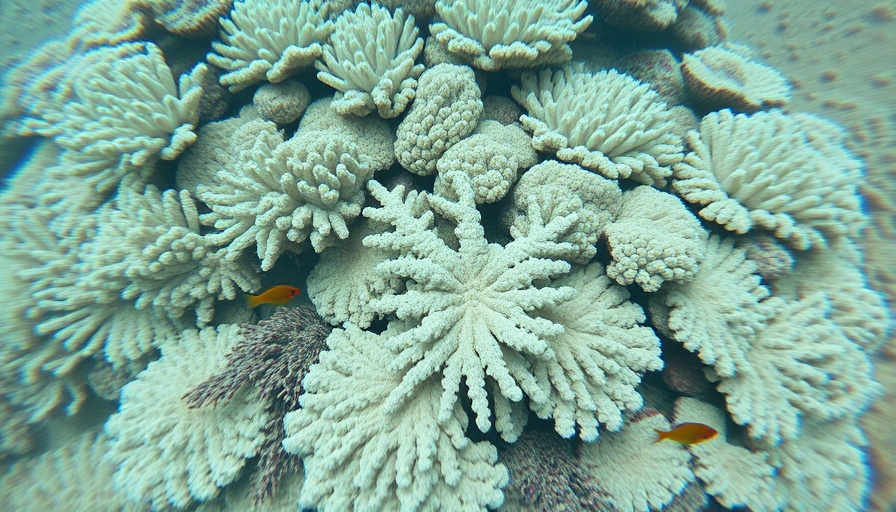
The Alarming State of Coral Reefs: An Urgent Wake-Up Call
A recent report led by an international team of 160 scientists has sounded the alarm on a crisis that could reshape our oceans and affect countless communities dependent on marine biodiversity. As coral reefs succumb to rising sea temperatures, experts warn that we have officially crossed critical ecological thresholds, marking the onset of catastrophic changes in marine ecosystems.
Understanding the Global Coral Crisis
The findings emphasize that coral reefs—home to a quarter of all marine species—are in imminent danger. Currently, the Earth has warmed by about 1.4 degrees Celsius, just beyond the tipping point of 1.2 degrees where coral bleaching becomes significant. This alarming change has already led to unprecedented levels of coral bleaching, particularly in tropical regions where waters have been exceptionally warm for extended periods.
Beginning in 2023, over 80% of coral reefs worldwide have experienced bleaching events, noticeably affecting ecosystems from the Great Barrier Reef to the Caribbean and beyond. As Professor Tim Lenton of the University of Exeter points out, the degradation of coral reefs is not a distant threat; it is a current reality impacting the lives of millions, illustrating the immediate effects of climate change.
Local Perspectives: A Call to Action
The community's response to this crisis reveals diverse viewpoints. Australian researcher Peter Mumby suggests that while reefs are under extreme duress, some species may exhibit resilience, adapting to warmer temperatures. However, he cautions that abandoning hope could lead to inaction. Instead, aggressive local and global measures are crucial to combat emissions and protect vulnerable ecosystems.
Meanwhile, experts from organizations like the World Wildlife Fund stress the need for urgent action. They identify 'refugia'—areas that remain relatively less impacted by climate change—as crucial hotspots for conservation efforts. Protecting these zones could provide essential genetic reservoirs for the future, aiding coral recovery as conditions improve.
Global Implications: What Lies Ahead?
As we gain awareness of the crisis at hand, we also face other looming threats. The feedback loop of climate impacts extends beyond just coral reefs to include the melting ice sheets of Greenland and West Antarctica, contributing to rising sea levels, and the destabilization of the Amazon rainforest, which could reach its tipping point under current warming trends.
According to global estimates, if emissions continue at their current pace, we could witness a 3-degree Celsius rise by the end of the century, triggering irreversible damage. Hence, the urgency for local and global policymakers to act has never been greater.
Making Informed Choices for the Future
So what can we, as environmentally conscious individuals, do in light of this information? Advocacy for reduced greenhouse gas emissions is crucial, as is supporting initiatives that promote renewable energy sources and sustainable practices. As witnessed recently with more clean energy produced from renewables than coal for the first time, we can shape a trajectory toward a healthier planet.
Our choices can influence the fate of the oceans and by extension, our planet. Gathering knowledge about the climate crisis, engaging in community conservation efforts, and supporting policies that prioritize ecological integrity can create a wave of change.
A Hopeful Outlook Amidst Crises
While the current state of coral reefs may seem grim, it’s not without hope. Understanding that ecosystems can transform rather than disappear makes the case for proactive measures, focusing on adaptive strategies that promote the resilience of marine life.
This ongoing dialogue about coral resilience and the need for urgent climate action reminds us that we hold a vital role in fostering a more sustainable future for our oceans. By continuing to educate ourselves and others, we help create a collective push for significant change.
This is a moment for action—a moment to safeguard the vibrant ecosystems that are integral to our planet's health. We must advocate for policies that not only halt further damage but also foster recovery and resilience among affected communities.
If you care about the health of our oceans and the diverse life they sustain, it’s time to act decisively.
 Rij toevoegen
Rij toevoegen






Write A Comment